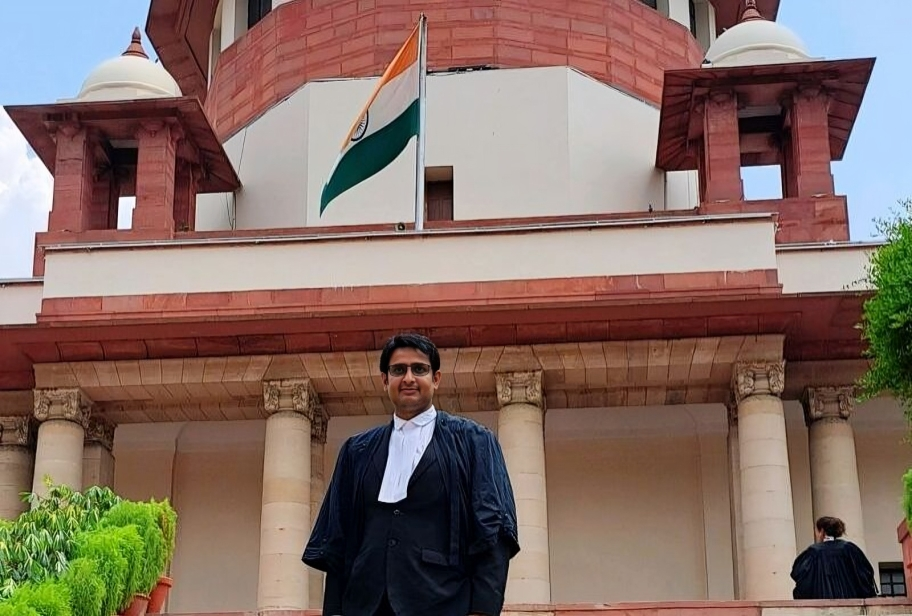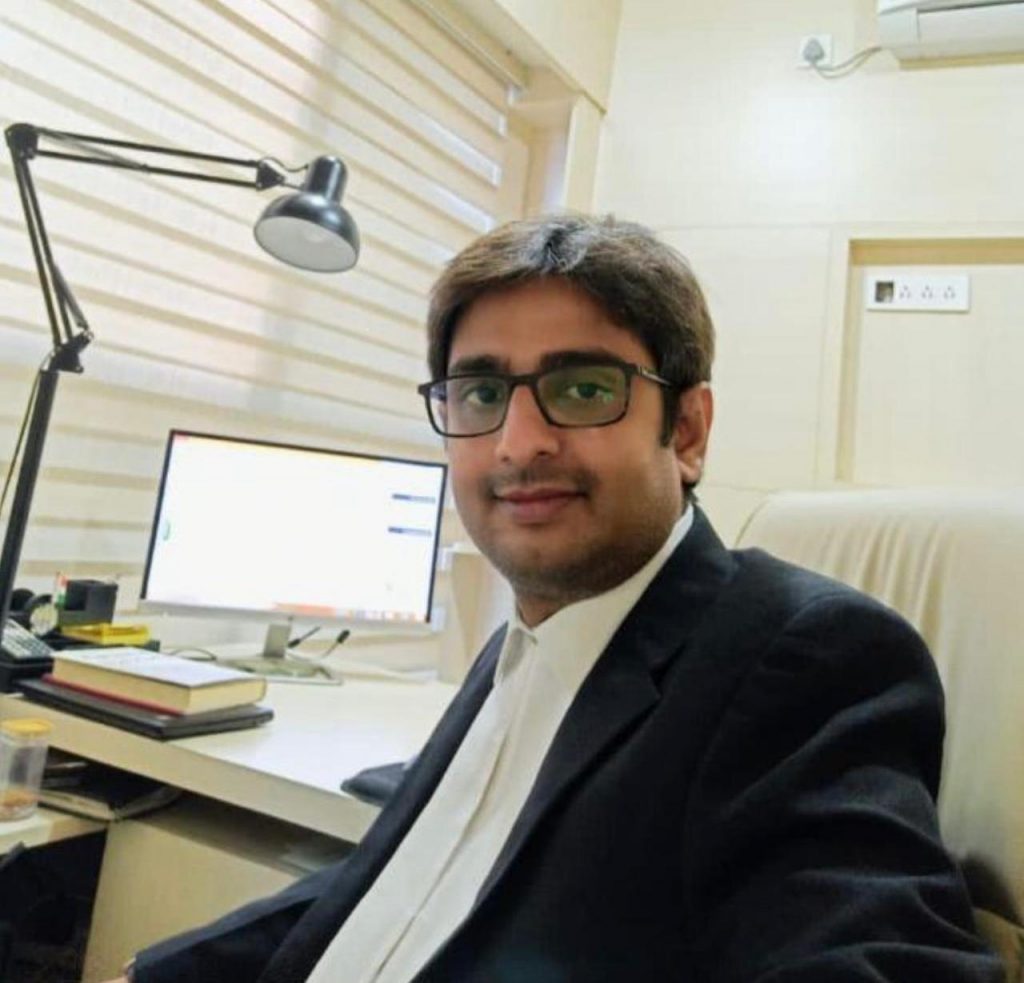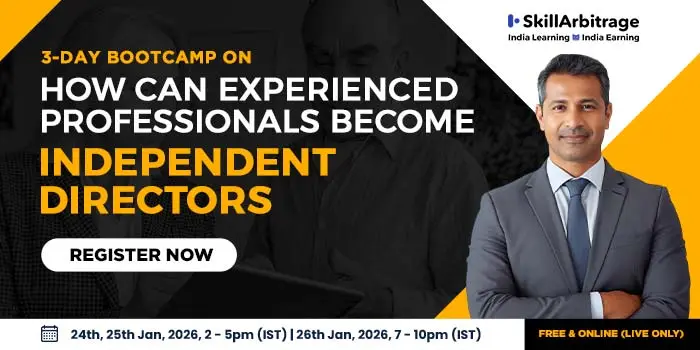This interview has been published by Anshi Mudgal and The SuperLawyer Team

You’ve mentioned that your advent into the field of law was almost accidental, as you initially planned to pursue an MBA in Pune but were influenced by friends studying law. How did that unexpected shift shape your career path and your approach to the profession?
I completed my schooling at a Government school in Rajasthan. In 2006, I moved to Pune for further studies. As everyone knows, Pune is often referred to as the “Oxford of the East.” At that time, Business Administration was in high demand, so after completing my schooling, I pursued a BBA in Pune. During those days, I had a few friends and acquaintances who were studying at various law schools. In the evenings, we would often meet for tea or simply hang out. They would share their experiences about academic activities, court visits, and legal studies. Listening to them gradually developed my interest in law, and I began considering admission to the field. Before enrolling in law school, I worked with the Symbiosis Group for a few months. However, when the time came to make a final decision whether to pursue an MBA or law. I was not fully confident and remained unsure. It was then that my father guided me towards pursuing law. With his approval and encouragement, I finally decided to enroll in law school. Most importantly, till date, my father has been a constant source of motivation and support, especially during a difficult phase when I felt like giving up legal practice and considering another career path. His encouragement has always kept me going.
You have conducted highly contested divorce cases, resolved long-pending disputes through mediation, and handled matters ranging from custody to NRI divorces. How challenging is it to navigate cross-border family disputes, particularly NRI divorces, and what key stakeholders are usually involved?
I have been practicing law since 2013, Over the years, I have handled hundreds of matrimonial disputes and cases in Ahmedabad, Pune and Mumbai, and have also appeared before several Hon’ble High Courts in India also before the Hon’ble supreme court of India. One common aspect in matrimonial disputes whether contested or mutual consent, whether involving NRIs, is that they often revolve around key issues such as claims of alimony, division of immovable assets, child custody, and other financial considerations. In such matters, the role of a lawyer is not limited to representing a client in court; it is also about guiding all stakeholders toward what is reasonable and achievable. In NRI divorce cases, the first challenge is often the logistical aspect ensuring the presence of parties or enabling their participation through virtual hearings, which most courts now facilitate. In mutual consent divorces for NRIs, the process can be straightforward once formalities are understood and complied with as per the law and procedure. From my experience, NRIs are usually clear about their terms, conditions, and settlement formulas, but it becomes the lawyer’s job to draft, execute, and present those terms in a legally sound manner so that there are no future disputes, particularly regarding child custody or financial obligations, another is regarding the if any joint property in foreign country and one of the spouse is in India and not looking for forward to go back., when I talk about long pending divorce cases I recall one particular case where a client had been contesting a matter for years. And later after a few years he came to me with the mindset of “ that he would only like to contest” rather than resolving it. After understanding his case history, I advised him that litigation should be the last resort, and that he should first try to settle the matter through communication either directly, via lawyers, or through mediation. Initially hesitant, he eventually followed my advice. Within three months, the matter was resolved amicably, something that could have been achieved years earlier had proper guidance been given. From my practice, I have learned that in matrimonial litigation especially highly contested and long-pending matters mediation is often the most effective tool. The key is to fully understand the facts, the parties’ financial capacities, the complexity of the issues, and the emotional aspects, and then to guide the stakeholders toward a reasonable middle ground. I firmly believe there should never be a point where a lawyer loses hope of settlement. Keeping that hope alive until the very end, unless a final order is passed, is essential in family disputes.
With over a decade of experience before the Family Courts and High Courts in both Gujarat and Maharashtra, what procedural differences have you observed while practicing in these jurisdictions?
This is indeed a very important question, because understanding procedural differences is crucial when practicing in different jurisdictions. Yes, there are significant differences between Gujarat and Maharashtra, and I have learned a great deal from working alongside lawyers in both states. When it comes to procedures, there are differences in the prescribed formats for filing applications, the method of preparing compilations, and the specific documentation requirements. The process for exhibiting documents also varies slightly between the two jurisdictions. In family matters, I have observed differences in the conciliation and mediation processes. The filing procedure itself also differs. For example, in Maharashtra, one can file a matter without physically going to court; everything can be done virtually through the court portal. Even the administration of an oath can be completed virtually by uploading a video, which is not the same in Gujarat. These procedural nuances highlight the importance of adapting to local practices while ensuring compliance with the law.
Your practice emphasizes amicable, reconciliation-focused solutions. What trends have you noticed in the growing use of ADR in matrimonial disputes, and how do you see it shaping the future of family law?
Yes, I strongly believe that there should be amicable solutions in matrimonial disputes because it is ultimately a question of precious time of life. If one is able to take a timely decision and resolve the dispute, it is far better than letting it remain in court for years, which rarely leads either party anywhere. However, it is important that both parties are willing to be reasonable with each other, even while keeping their differences, and remain focused during mediation. Nowadays, I see that even the Hon’ble Supreme Court actively promotes mediation in many matters. In my experience, Family Court judges also often take the initiative to speak with both parties, understand their concerns, and encourage amicable settlements. If the parties show willingness, mediation can be a highly effective tool. Such solutions can be facilitated by any authority through various methods, including formal mediation or counselling. Sometimes, emotions run high and parties are initially unable to take rational decisions. However, after proper counselling, they are often in a better position to make fair and reasonable decisions. Therefore, irrespective of the situation, I always advise that Alternative Dispute Resolution (ADR) and amicable settlements should be explored, as they are often the best way to ensure a fair and lasting resolution.
You began your career as a Legal Associate under senior advocates before founding your own firm. What lessons from those early years continue to guide your courtroom strategy today?
Yes, I began my career working with a lawyer who had many years of experience. I learned a great deal from advocates during my time in Pune and later in Ahmedabad. One of the key lessons I have learned is that if you wish to succeed as a litigation lawyer particularly in matrimonial matters, which often involve divorce, custody disputes, alimony, maintenance, and domestic violence, the first and foremost skill you need is to listen carefully to your client. You must understand where the real problem lies, while also respecting the emotional circumstances of the parties. I have also learned that you should never be judgmental when listening to clients. Instead, your role is to ensure you understand their circumstances fully. From my seniors, I learned the importance of proper drafting and being thoroughly prepared with arguments. I recall that when I was assisting senior lawyers, they would take detailed notes point-by-point and spend hours preparing final arguments for divorce cases. Contrary to the perception that matrimonial litigation is straightforward, I have found it to be complex, involving significant factual and legal research, especially since family disputes often involve many incidents that form the grounds for divorce. As per High Court and Supreme Court judgments, it is essential to keep updating oneself on recent case law. I have made it a habit to learn continuously from court proceedings, by listening to arguments and closely studying judgments.
What motivated you to establish your own practice, and what vision did you have for it in the beginning? How did you overcome the initial challenges?
It is always a challenge to choose litigation as a career after completing law. Initially, I opted for corporate work, but later my father motivated me to practice in court. He advised me to go to the court every day, whether I had a brief or not. I had no contacts who could help me enter the field of litigation, so I followed my father’s advice. I began visiting the court daily and interacting with lawyers. Eventually, I met one of my professors from my graduation days, who was also a practicing lawyer. I sought his help and asked if I could join his office. He told me that he didn’t have many matters at that time but could refer me to someone else. He gave me a reference to another advocate in Pune. When I went to meet this advocate, he asked me just one question: “When do you want to start?” My answer was, “I can start right now.” He immediately agreed and told me I could join and start working. I didn’t even go back home. I began working on the brief that very day. The second thing he told me was, “You will have to work hard, I will take care of your basic needs and concerns.” That assurance gave me the confidence I needed, and that is how my journey began. And this is how my journey started for my first client. One thing I learned early on is that you never know where clients will come from. They may walk in from anywhere, even from the court corridors. Sometimes, they may watch you argue in court, be impressed with your performance, and later ask for your contact details. In this profession, your performance is what pays you both in the form of clients and valuable contacts.
What inspired you to choose matrimonial and family litigation as your primary specialization, and how has working in this niche shaped your perspective on law?
Yes, my interest gradually shifted towards matrimonial law. Since I started my practice, I used to accompany my senior in family court matters assigned to me. Most of these cases, particularly matrimonial disputes, involved domestic violence and divorce. Slowly and gradually, this became my primary practice area. Although I have also handled other matters, over time my focus has increasingly been on matrimonial disputes and family matters. While I would not call it a specialisation, with experience I have gained significant exposure in this field. As I have already stated, dealing with matrimonial matters is not easy. It requires a great deal of skill, patience, and the ability to handle sensitive human emotions. I believe this area of law has immense potential, and one should continue to explore, understand, and work in depth within family and matrimonial matters
Having such a diverse practice now and over a decade of experience, what advice would you give to new entrants in the field of law?
All entrants in the field of law must be prepared to work hard, especially in the initial stages. One should not assume that any particular branch of law is not worth exploring. If an opportunity comes your way, it should be accepted and explored, as it may eventually lead to your mainstream practice. Therefore, do not make up your mind too early or immediately after graduating from law school. Take up different matters, handle them diligently, and if needed, seek guidance from experienced senior lawyers or practitioners in that particular area. Learn from each experience, as this gradual exposure will help you discover your true area of interest and expertise.
Managing a practice across two jurisdictions can be demanding. How do you balance professional commitments with personal life, and what activities help you unwind and recharge?
Yes, certainly, sometimes it requires motivation, but right from the beginning I chose to practise in two jurisdictions. As far as personal life is concerned, it goes without saying that law is a profession where, especially in the initial years, one has to compromise on personal life and carry the pressures of professional responsibilities. Being a noble profession, law demands complete dedication and 100% commitment. There is no other option but to prioritise professional life first. After a certain number of years, personal life also finds its balance, as family members begin to understand the efforts and challenges of a lawyer’s journey. Eventually, it becomes a routine. So yes, whether personal or professional, at the end of the day, life goes with the flow, and with time one learns how to manage both.
Get in touch with Rajiv Rajpurohit –





fghg